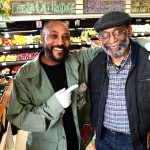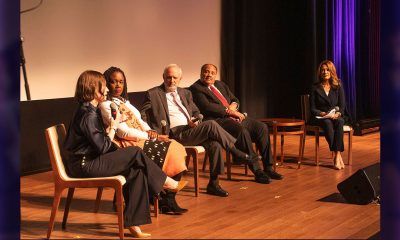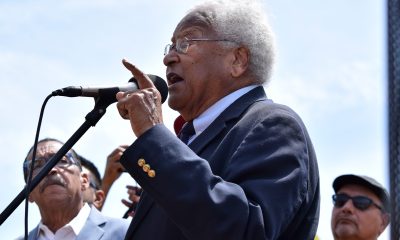Community
To Fulfill MLK’s Dream for Economic Justice, Co-ops Like Mandela Grocery May be Answer
With 11 years of business growth, Mandela Grocery is leading the way to help form new worker co-ops in Oakland. Last spring, Mandela Grocery facilitated a 12-week, on-the-job training with founding members of the DEEP Grocery Cooperative in East Oakland. Additionally, Mandela Grocery is supporting a local Black-owned delivery service, Piikup, transition to worker ownership.
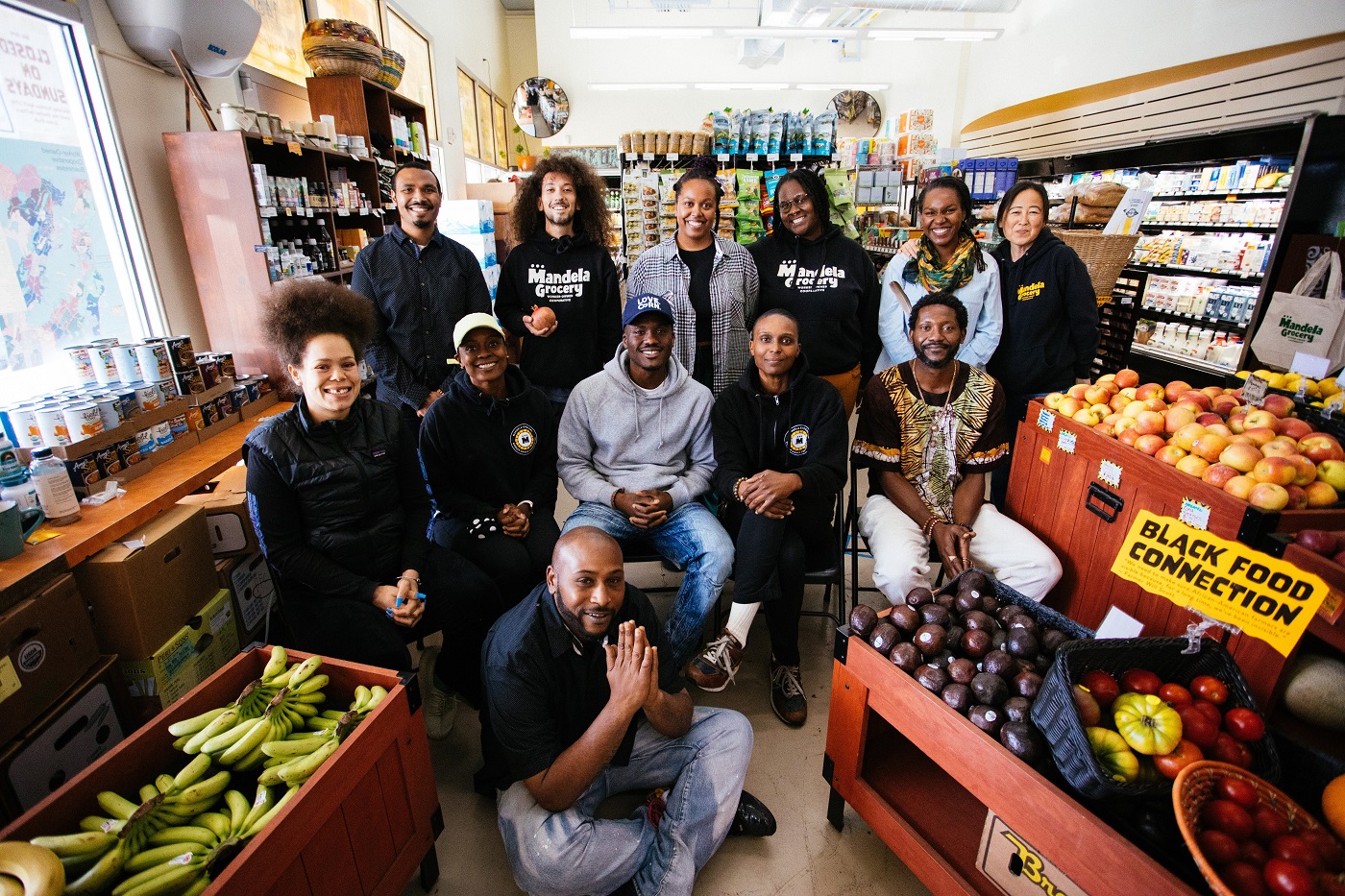
- photo by A.C. Fike from left to right James Bell and the late Dennis Terry
“The March on Washington for Jobs and Freedom” was the official name for 1963’s March on Washington. Throughout his activist life, Dr. Martin Luther King, Jr. saw economic justice as the most important problem facing Black people in America. Most dire, the affliction of unemployment among Black youth.
Mandela Grocery Cooperative, West Oakland’s worker-owned grocery store with an average worker age of 30, challenges the unemployment problem and lack of dignified jobs head on.
With 11 years of business growth, Mandela Grocery is leading the way to help form new worker co-ops in Oakland. Last spring, Mandela Grocery facilitated a 12-week, on-the-job training with founding members of the DEEP Grocery Cooperative in East Oakland. Additionally, Mandela Grocery is supporting a local Black-owned delivery service, Piikup, transition to worker ownership.
Worker co-ops are the more imaginative approach to job creation, offering guaranteed jobs and self-determination. Workers form and join cooperatives to own and manage the business themselves.
Since the start of the pandemic and racial justice actions of 2020, Mandela Grocery has seen a sharp increase in sales and loyal customers seeking to support local, Black-owned businesses. Worker co-ops are beacons of community development offering positive psychological and social benefits plus local economic change.
In his essay, “The Cooperative Alternative,” the late Dennis Terry, Mandela Grocery’s first retiree, wrote that among the many ideals cooperatives aspire to, worker cooperatives “build community instead of abandoning it” and “promote worker solidarity instead of divisiveness.”
We need not compete for jobs as we struggle to build our communities. We must create meaningful jobs ourselves so that competition for dignified work becomes obsolete.
Mandela Grocery’s vision responds to Dr. King’s call for creative job expansion: Jobs for the people in the neighborhood. Jobs that build income, skills and community amenities. Jobs that function for our neighbors. Cooperative jobs can be jobs in various industries that are complementary and essential such as groundskeeping, design and building, food production and food distribution.
Dr. King created a blueprint for jobs creation in his proposal for guaranteed jobs:
- The development of skills and education are outcomes and not prerequisites of the jobs program.
- The jobs are producing community and public services that are in short supply and benefit the most vulnerable.
- The job program guarantees income for individuals and families that have unmet needs.
The dignity of workers is the basis of worker cooperatives. Worker co-ops live the promise of Dr. King’s vision for economic justice. “The dignity of the individual will flourish when the decisions are in [their] own hands, then [they] have the means to seek self improvement,” said Dr. King.
Over 50 years ago, Dr. King clarified a path for economic justice rooted in cooperative values. In the wake of 2020, it is time to align our actions with these values, guaranteeing dignified work now, and for generations to come.
Visit Mandela Grocery at 1430 7th St. in West Oakland. Order online www.mandelagrocery.coop/order.
Activism
Oakland Post: Week of January 8 – 14, 2025
The printed Weekly Edition of the Oakland Post: Week of January 8 – 14, 2025
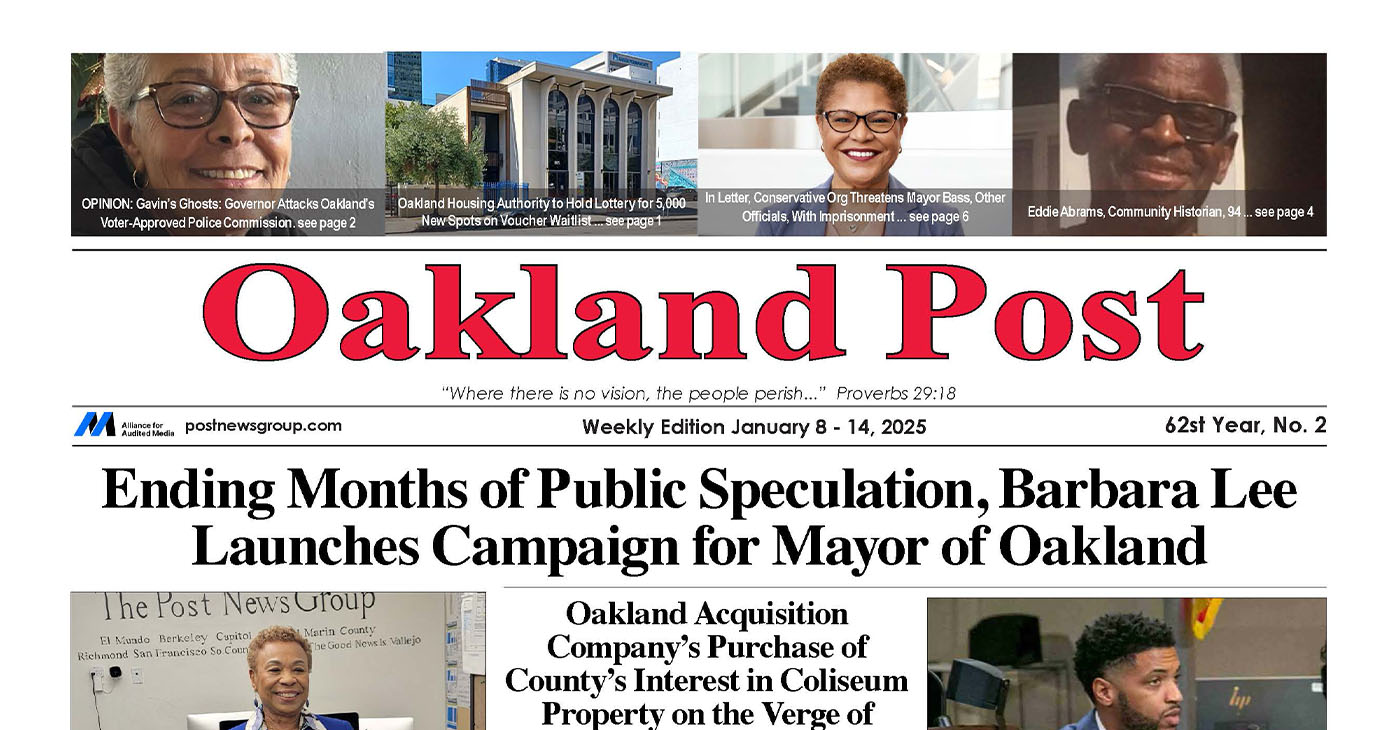
To enlarge your view of this issue, use the slider, magnifying glass icon or full page icon in the lower right corner of the browser window.
#NNPA BlackPress
Supreme Court Decision Confirms Convicted Felon Will Assume Presidency
NNPA NEWSWIRE — In a 5-4 ruling, the court stated that Trump’s concerns could “be addressed in the ordinary course on appeal” and emphasized that the burden of sentencing was “relatively insubstantial” given that Trump will not face prison time. Chief Justice John Roberts and Justice Amy Coney Barrett joined the court’s three liberal justices in the majority, with four conservative justices dissenting.

By Stacy M. Brown, NNPA Newswire Senior National Correspondent
@StacyBrownMedia
The Supreme Court on Thursday rejected President-elect Donald Trump’s emergency request to block criminal proceedings in his New York hush money case, ensuring that a sentencing hearing will proceed as scheduled on Friday. The decision makes it official that, on January 20, for the first time in its history, the United States will inaugurate a convicted felon as its president.
In a 5-4 ruling, the court stated that Trump’s concerns could “be addressed in the ordinary course on appeal” and emphasized that the burden of sentencing was “relatively insubstantial” given that Trump will not face prison time. Chief Justice John Roberts and Justice Amy Coney Barrett joined the court’s three liberal justices in the majority, with four conservative justices dissenting.
Trump was convicted in May for falsifying business records related to a $130,000 payment to adult film star Stormy Daniels before the 2016 election. Manhattan District Attorney Alvin Bragg argued that the Supreme Court lacked jurisdiction to intervene in a state criminal case, particularly before all appeals in state courts were exhausted.
Trump’s legal team claimed the sentencing process would interfere with his transition to power and argued that evidence introduced during the trial included official actions protected under the Supreme Court’s prior ruling granting former presidents immunity for official conduct. Merchan, the New York judge who presided over the trial, ruled in December that the evidence presented was unrelated to Trump’s duties as president.
Prosecutors dismissed Trump’s objections, stating that the sentencing would take less than an hour and could be attended virtually. They said the public interest in proceeding to sentencing outweighed the President-elect’s claims of undue burden.
Justice Samuel Alito, one of the four dissenting justices, confirmed speaking to Trump by phone on Wednesday. Alito insisted the conversation did not involve the case, though the call drew criticism given his previous refusals to recuse himself from politically sensitive matters.
The sentencing hearing is set for Friday at 9:30 a.m. in Manhattan. As the nation moves closer to an unprecedented inauguration, questions about the implications of a convicted felon assuming the presidency remain.
“No one is above the law,” Bragg said.
Activism
Barbara Lee Launches Campaign for Mayor of Oakland
“At this critical moment, we must not be a city divided, but a community united,” she Lee. “If elected I will bring my hands-on leadership, new ideas and decades of experience in identifying billions in resources for our great city, so all residents and businesses are stronger and safer and our community has optimism and confidence in Oakland’s future.”

By Post Staff
Barbara Lee on Wednesday morning formally announced her candidacy for Mayor in Oakland’s April 15 special election.
“Time and time again, Oaklanders have faced our toughest obstacles by uniting to meet our challenges,” said Lee.
“At this critical moment, we must not be a city divided but a community united,” she said. “If elected, I will bring my hands-on leadership, new ideas, and decades of experience in identifying billions in resources for our great city so all residents and businesses are stronger and safer and our community has optimism and confidence in Oakland’s future.”
“As Mayor, I’ll address our homelessness crisis, prioritize comprehensive public safety and mental health services, and lead with fiscal responsibility to deliver the core City services residents and business owners deserve. Let’s do this – together.”
“I’ve never shied away from a challenge,” said Lee. “I’m always ready to fight for Oakland.”
Watch her campaign video here, which is online at BarbaraLee4Oakland.com
-

 Activism3 weeks ago
Activism3 weeks agoBooks for Ghana
-

 Arts and Culture4 weeks ago
Arts and Culture4 weeks agoPromise Marks Performs Songs of Etta James in One-Woman Show, “A Sunday Kind of Love” at the Black Repertory Theater in Berkeley
-

 Bay Area3 weeks ago
Bay Area3 weeks agoGlydways Breaking Ground on 14-Acre Demonstration Facility at Hilltop Mall
-

 Activism4 weeks ago
Activism4 weeks ago‘Donald Trump Is Not a God:’ Rep. Bennie Thompson Blasts Trump’s Call to Jail Him
-

 Arts and Culture3 weeks ago
Arts and Culture3 weeks agoIn ‘Affrilachia: Testimonies,’ Puts Blacks in Appalacia on the Map
-

 Activism3 weeks ago
Activism3 weeks agoLiving His Legacy: The Late Oscar Wright’s “Village” Vows to Inherit Activist’s Commitment to Education
-

 Alameda County3 weeks ago
Alameda County3 weeks agoAC Transit Holiday Bus Offering Free Rides Since 1963
-

 #NNPA BlackPress4 weeks ago
#NNPA BlackPress4 weeks agoCalifornia, Districts Try to Recruit and Retain Black Teachers; Advocates Say More Should Be Done

